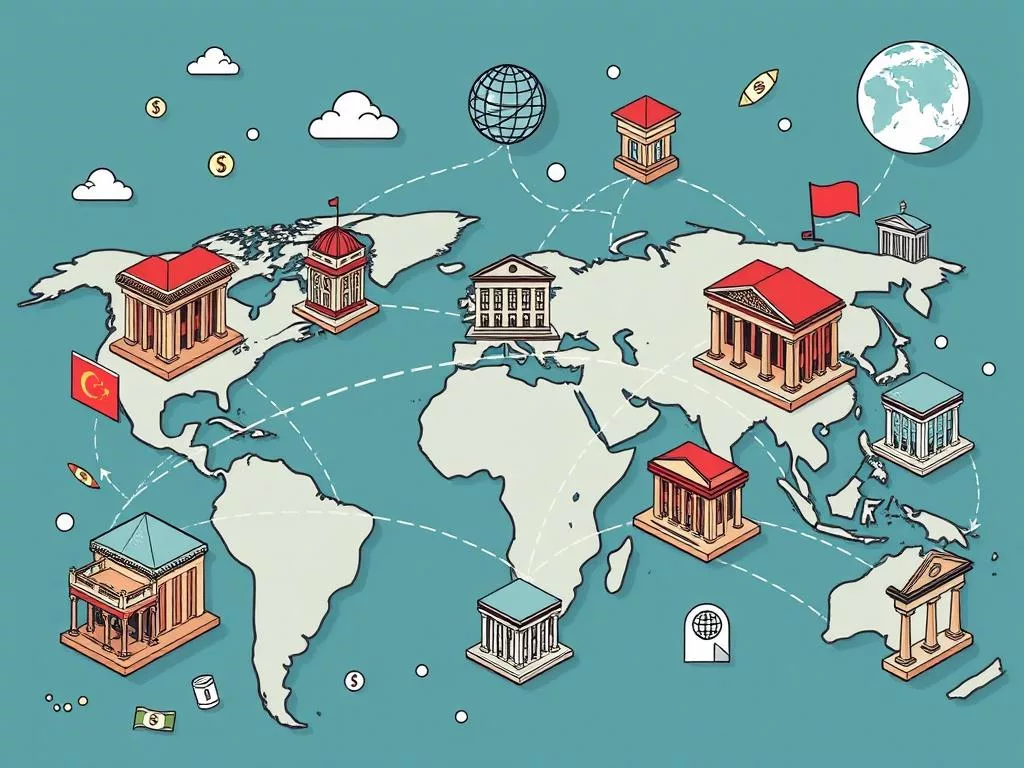Correspondent banking connects domestic and international banks, making global financial transactions easier. It’s key for smooth international trade and economic activities. Services like wire transfers and currency exchange are part of what they offer.
Correspondent banks are vital for handling cross-border payments. They ensure financial transactions are processed efficiently worldwide.
They use nostro and vostro accounts and send millions of messages daily via the SWIFT network. They also do strict money laundering checks. This makes international banking safer.
Correspondent banks help with both corporate and personal money transfers. They are essential for expatriates and businesses in global trade.
Definition and Functions of Correspondent Banking
The correspondent banking definition is about banks working together across borders. They help each other out by making deals. This way, banks can reach more customers worldwide without opening new branches.

Correspondent banks do many important things. They help with wire transfers, foreign currency, and trade finance. These services are key for international trade and investment.
They make sure payments are safe and smooth. They also manage accounts for both domestic and foreign banks. This keeps the flow of money going smoothly.
Correspondent banking lets banks offer services like letters of credit. These are important for making sure payments are safe. It helps banks serve customers better, even if they’re far away.
It also helps more people and businesses get access to global financial services. This is great for those in remote or developing areas.
Also, international payment services are a big part of it. They help businesses invest abroad. This connects banks worldwide, making it easier to move money across borders.
But, there are challenges too. Banks must follow strict rules to avoid money laundering. They need to check their partners carefully to stay safe.
New tech like blockchain and digital identity can make things better. Artificial intelligence and data analytics can help spot money laundering. This keeps banks in line with the law.
In short, correspondent banking is key for international trade and helping people worldwide. Knowing about it helps us see its role in the global financial world. As more people need to send money across borders, correspondent banks will keep playing a big part.
How Correspondent Banking Works
Correspondent banking is a complex system where banks work together to handle transactions. They do this when there’s no direct link between them. This teamwork is key for smooth international banking.
Correspondent banks act as middlemen. They make sure money moves around the world in different currencies. This is done through the SWIFT network, a global system for secure financial messages.

The SWIFT network is vital for these operations. It helps banks send and receive payments securely. For example, it’s used for international trade payments and wire transfers.
But, correspondent banking faces risks like money laundering. The United Nations says money laundering costs between $800 billion and $2 trillion a year. This is a big problem because of the lack of knowledge about other banks’ clients.
To fight these risks, the Financial Action Task Force (FATF) has set rules. These rules help banks follow strict anti-money laundering practices.
Despite these risks, correspondent banking is essential for global finance. The value of international payments is set to grow from $150 trillion in 2017 to over $250 trillion by 2027. This shows how important it is for international finance.
But, some areas face challenges in correspondent banking. Caribbean and African countries struggle to keep these banking relationships. This makes it hard for them to access global financial systems.
Working together is key to solving these problems. Banks, regulators, and tech companies need to collaborate. They should invest in training and use new technologies like AI for better money laundering detection. For more information, check out this guide on international banking.
Guide to Correspondent Banks: Risks, Fees, and Alternatives
Correspondent banking is key for global B2B payments but comes with challenges. Money laundering and fraud are big risks due to complex banking networks. Despite strict rules, these problems continue. As B2B payments grow, keeping transactions safe is more important than ever.
Correspondent bank fees can be high and vary a lot. These fees come from the role banks play in cross-border deals. New fintech options like Wise and Currencies Direct offer better rates and service. Real-time payments are also changing the game, making transactions faster than before.
New tech is leading to alternatives to traditional banks. Blockchain and APIs make transactions clearer and cheaper. Digital currencies like Bitcoin and CBDCs settle faster and cost less. Some companies are focusing on local payments that meet specific needs and follow local rules.
Big banks are teaming up with tech companies for better payment solutions. This move towards B2B2C models means services can grow and reach more customers. For more on currency exchange fees, check out this guide. This change marks a new era in payments, with more efficient and cost-effective options than old banking methods.

